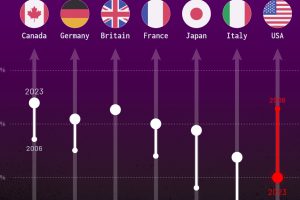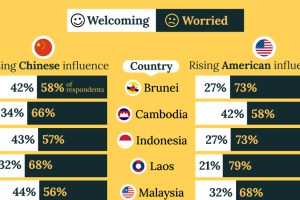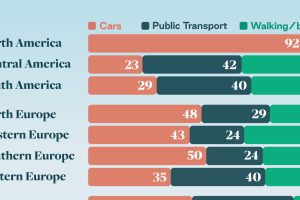See full-size infographic for more legibility.

The Race for Arctic Domination
Note: see full-sized infographic for more legibility.
In the year 1776, James Cook was dispatched from Great Britain on an important mission: to discover the Northwest Passage. The famed hypothetical route from the Pacific to the Atlantic was a primary motivation for many British expeditions to the New World. Such a route would expedite trade between Europe and Asia, creating wealth for the kingdoms and merchants that could navigate it. The British government tried to motivate explorers even more by putting into law that there would be a prize of £20,000 for whoever could make such a discovery.
After spending some time in Hawaii, Cook came at it from the Pacific side. He and his crew searched northwards along the long coast of British Columbia, and eventually made his way in between Alaska and Russia through the Bering Strait. Seeing nothing but icebergs, it became clear that there was no navigable passage that could be seen.
For close to 300 years, explorers had searched for such a route, but ice and cold made it ultimately impossible for the technology of the day. Even Robert McClure, who was credited with the discovery of the Passage, got stuck in ice for three winters near Banks Island and had to be rescued.
Today, these routes through Northern waters have regained importance. Over recent decades, ice has thawed in the Arctic and 2008 became the first year that both the Northeast Passage (North of Russia) and the Northwest Passage (North of Canada) were open to ships simultaneously. This means it may be the first time that a vessel could theoretically circumnavigate the North Pole in 125,000 years.
Not surprisingly, countries such as Russia, Canada, Norway, Denmark, and the United States have taken notice and are posturing accordingly. The thawing waterways of the Arctic are the potential home to shipping routes, natural resources, and other territorial claims. For example, the US Geological Service estimates that the Arctic is home to 13% of the world’s undiscovered oil, as well as 30% of its undiscovered natural gas.
However, nation-states are not the only group engaged in this Battle Royale. Environmentalists have also entered the ring, and they’ve already helped to deliver a solid takedown. In September 2015, Royal Dutch Shell announced that they would abandon their Arctic drilling campaign even after spending $7 billion on the well. Realistically, there were several reasons for the change of plans, but traction on behalf of environmentalists definitely played a key role.
While some experts are referring to this as a new Cold War (pun likely intended), the conquest for Arctic domination is certainly heating up.
Original graphic by: SCMP





